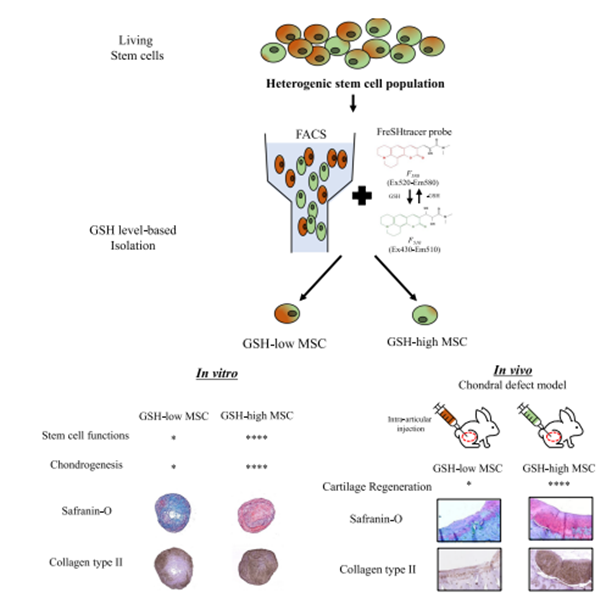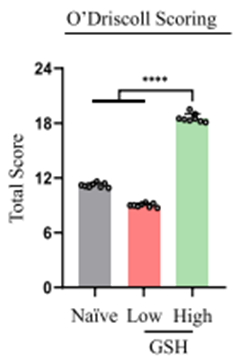Seoul National University Hospital opens up the possibility of excellent cartilage regeneration treatment through stem cell isolation and culture.
Seoul National University Hospital opens up the possibility of excellent cartilage regeneration treatment through stem cell isolation and culture.
- Fluorescent marker can selectively separate mesenchymal stem cells based on glutathione levels.
- Highly-glutathione mesenchymal stem cells enhance excellent stem cell ability, cartilage differentiation ability, and in vivo cartilage regeneration ability treatment efficacy
Recently, research results showed that using a new fluorescent marker (FreSHtracer probe), mesenchymal stem cells can be selectively separated according to the intracellular glutathione level, and the highly functional stem cells with high glutathione levels isolated in this way have enhanced stem cell ability, cartilage differentiation ability, and cartilage regeneration in vivo, therefore, the treatment efficacy is excellent.
Seoul National University Hospital Department of Orthopedics Han Hyuk-Soo's team (Bae Hyun Cheol: Research Professor, Cho Gun Hee: Seoul National University Stem Cell Biology Master's Candidate) has developed isolation and culture technology for highly functional mesenchymal stem cells isolated using a new fluorescent marker. The team announced the results of this technology analysing the efficacy of an excellent cartilage regeneration treatment on August 10th.
Cartilage is a tissue composed of cartilage cells and cartilage matrix. It helps joints move smoothly and prevents friction between bones. ‘Cartilage defect’ is a disease in which this cartilage, the tissue covering the bone, is damaged due to reasons such as high weight bearing and an increase in fibrocartilage. This disease, which commonly occurs in the knee joint, causes pain and limits daily activities, and if left untreated, it can lead to damage to surrounding tissues and arthritis. Due to the recent increase in sports and the elderly population, the incidence of cartilage defects is also increasing every year.
In the early stages of cartilage defects, steroidal analgesics anti-inflammatory drugs, and hyaluronic acid injections are used, and depending on the degree of progression, autologous chondrocyte transplantation and microfracture are performed to induce cartilage regeneration. Recently, many studies have been underway on cartilage regeneration treatments using allogeneic mesenchymal stem cells.
Mesenchymal stem cells (MSCs) are stem cells that exist in bone tissue, adipose tissue, and bone marrow matrix differentiated from mesoderm produced by the division of a fertilized egg and are a representative cell source for cartilage regeneration. However, quality control is important because the function of these cells can vary depending on cell culture conditions, donor age, and population heterogeneity.
However, in the case of these stem cell-based cell therapies, there were limitations such as the lack of process standardization and quality control in a subculture (transferring cells to a new culture dish for cell proliferation and cultivating successive generations of cells) and deterioration of stem cell performance during long-term culture.
To overcome these limitations, Professor Han Hyuk-Soo’s team at Seoul National University Hospital and the joint research team of Cell2in Inc. previously developed a new fluorescence marker that can monitor the cellular level of glutathione (GSH, glutathione), a representative antioxidant factor within cells known to be closely related to stem cell function.
Using this study, the research team investigated whether highly functional mesenchymal stem cells could be selectively separated according to glutathione levels. The research team wanted to evaluate the cartilage-forming potential of highly functional mesenchymal stem cells (MSCs) with high glutathione levels to see if they could repair cartilage defects in vivo.
Therefore, the research team used fluorescent markers to determine the function of mesenchymal stem cells according to glutathione levels by evaluating the stem cells' specific marker expression, migration ability, colony formation ability, and oxidative stress resistance ability. In addition, to evaluate the cartilage differentiation function, expression of factors related to cartilage differentiation and 3D culture were performed through a cartilage differentiation induction test.
As a result, it was confirmed that mesenchymal stem cells with high glutathione levels had excellent stem cell function and cartilage differentiation ability.
Subsequently, the research team used a rabbit cartilage defect model to evaluate the in vivo cartilage regeneration ability of highly functional mesenchymal stem cells selectively isolated based on glutathione levels by injecting the stem cells into the joint and performing histological analysis.

[Graphical Abstract] We showed that it is possible to selectively separate mesenchymal stem cells (MSCs) based on intracellular GSH levels using a fluorescent marker (FreSHtracer probe) from heterogenic stem cell populations that are not uniform in performance. Functional stem cells were confirmed to have excellent stem cell ability, cartilage differentiation ability, and in vivo cartilage regeneration ability. (Source: Cho et al., 2023, Biomaterials Research)
|
|
|
|
|
|
|
|
[Figure] Excellent hyaline cartilage regeneration was observed in the group injected with highly functional high-glutathion mesenchymal stem cells. (Cho et al., 2023 Biomaterials Research) |
|
|
|
 |
||
|
|
|||
As a result of the analysis, only high-glutathione mesenchymal stem cells showed improved bonding with surrounding tissues and regeneration into hyaline cartilage (a main component of articular cartilage). In O'Driscoll scoring, which evaluates the degree of hyaline cartilage regeneration, excellent hyaline cartilage regeneration was observed in the group injected with highly functional high-glutathione mesenchymal stem cells. The research team explained that this opens the possibility of improving the effectiveness of cartilage regeneration treatment through high-functional mesenchymal stem cell isolation and culture technology in the future.
Professor Han Hyuk-Soo of the Department of Orthopedic Surgery said, “Through this study, we confirmed the possibility of isolating and culturing highly functional stem cells using a new fluorescent marker and that the isolated highly functional high-glutathione stem cells showed excellent hyaline cartilage regeneration efficacy.” “This is a meaningful result that enables quality control, which is a limitation in the development of stem cell therapy and can further be used as an objective indicator for effectiveness evaluation in the development of mass cell culture technology for highly functional stem cells with high cartilage regeneration treatment efficacy. The significance of the study was stated, “This is a study that takes us one step further toward effective clinical application of regenerative stem cell therapy.”
This study was published in the prestigious international academic journal ‘Biomaterials Research’ (IF:15.863).
[Photos from left] Department of Orthopedic Surgery Professor Han Hyuk-Soo, Research Professor Bae Hyun Cheol, and Seoul National University Stem Cell Biology Master's Candidate Mr Cho Gun Hee